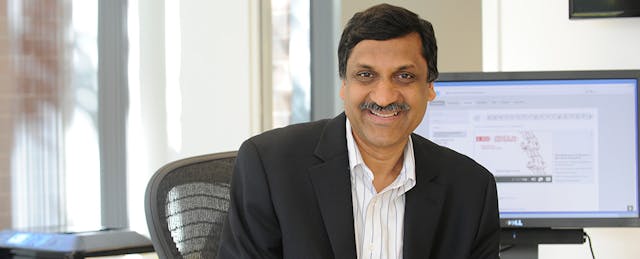At the Socializing Credential Innovation panel at SXSWedu on March 10, Jake Schwartz of General Assembly raised an important question. What is more valuable in the credentialing space: credentialing that’s branded by a corporation, or that branded by a higher education institution?
If you talk to MOOC-provider edX, specifically VP of Product Beth Porter or CEO Anant Agarwal, you’ll quickly find that edX is taking the “both” approach, evidenced by the nonprofit’s recently-announced partnership with Microsoft.
On Tuesday, March 10, edX announced at SXSWedu that Microsoft will join its ranks as its first corporate member, creating seven courses meant to drive learner development of IT knowledge and skills, from cloud management in Azure to programming with C#. All courses are taught by Microsoft experts and are comprised of assessments, exercises, and in-MOOC coding. The full list goes as follows:
- Programming with C#
- Introduction to TypeScript
- Introduction to Bootstrap
- Querying with Transact SQL
- Building Cloud Apps with Microsoft Azure
- Introduction to Office 365 APIs
- Windows PowerShell Fundamentals
Courses are now open for enrollment and start at the end of March.
“We're looking to bring in a broader range of courses from industry experts. People can directly get jobs for IT-kinds-of-skills after doing these courses,” shared Agarwal in an interview with EdSurge, adding that Microsoft has developed “an XBlock that enables course creators to embed Office Mix lectures into their edX courses.”
Not surprisingly, all seven of the MOOCs feature Microsoft products as an integral part of the learning experience, which in the end may benefit Microsoft nearly as much as the learner. As important as credentials often are to a learner’s completion of a course (“The pass rate jumps from 5% to 60% if the learner signs up to obtain a credential,” shares Agarwal), having the skills to use Microsoft products could give Microsoft a direct pipeline of potential engineers.
When will corporations start building/sponsoring their own degree programs to cultivate their future talent directly? #socialcred #SXSWedu
— Tom Segal (@tomsegal) March 10, 2015
Visitors to the Socializing Credential Innovation panel (#socialcred) brought up similar questions of how corporate environment might create their own credentialing programs and create pipelines, as shown in the Tweet above. Perhaps this edX-Microsoft model will set the example.


